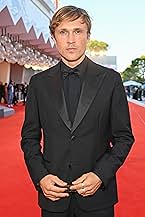Die Geschichte eines Jungen im turbulenten Neapel der 1980er Jahre. Sorrentinos bisher persönlichster Film ist eine Geschichte über Schicksal und Familie, Sport und Kino, Liebe und Verlust.Die Geschichte eines Jungen im turbulenten Neapel der 1980er Jahre. Sorrentinos bisher persönlichster Film ist eine Geschichte über Schicksal und Familie, Sport und Kino, Liebe und Verlust.Die Geschichte eines Jungen im turbulenten Neapel der 1980er Jahre. Sorrentinos bisher persönlichster Film ist eine Geschichte über Schicksal und Familie, Sport und Kino, Liebe und Verlust.
- Für 1 Oscar nominiert
- 32 Gewinne & 66 Nominierungen insgesamt
Betty Pedrazzi
- Baronessa Focale
- (as Betti Pedrazzi)
Handlung
WUSSTEST DU SCHON:
- WissenswertesAccording to Paolo Sorrentino, it was Alfonso Cuarón's Roma (2018), which was based on Cuaron's childhood in Mexico City, that gave Sorrentino permission to commit his own experience to film. For Sorrentino realized that "a personal, private film could tell a universal story."
- Zitate
Antonio Capuano: Remember, those without courage don't sleep with beautiful women.
- SoundtracksNapule è
Written and performed by Pino Daniele
Ausgewählte Rezension
"Cinema is a distraction, reality is second-rate." Fellini (overheard in in this movie)
As Oscar-winning director Paolo Sorrentino's stand-in, Fabietto (Filippo Scotti), comes of age in The Hand of God, he experiences the vagaries and beauties of Neapolitan life, not the least of which is his growing love of cinema. While half way through he will experience a life-changing tragedy, he will throughout be an observer of Naples with its Fellini-like freaks and gorgeous gulf-coast scenery. In a way, this is Sorrentino's Amarcord.
The Hand of God is a title derived from the description of soccer god, Diego Maradona, and his magical, controversial goal in the 1986 World Cup quarterfinal. It also could refer to the Sistine Chapel's fingers, and many other references that bolster this luminous description of Sorrentino's early life in Naples.
When Fabietto sees his aunt, Patrizia (Luisa Ranieri), naked on occasion, Sorrentino shows the emerging appreciation of sexuality in a young-man's sensibility and the parallel lushness of Italy, whose food is legendary and sensuality eternal. Both his older brother Marchino (Marlon Joubert) and he are transfixed by the eroticism, which undoubtedly creeps into all of Sorrentino's work.
Patrizia fuels the erotic fantasies of Fabietto and his older brother Marchino (Marlon Joubert), an aspiring actor too conventionally handsome to be of interest to the great Fellini.
It's as if Sorrentino is saying that these images helped him form his cinematic persona and lifelong affection for his youth in a culturally-rich country. The appearance of a Neapolitan folklore hero, a child monk in a sumptuous palazzo with a deteriorating chandelier, is just one of the many images Sorrentino uses to emphasize the wealthy culture he grew up in.
In addition to the tragedy, Fabietto is most moved by an encounter at a shoot in the historic Galleria Umberto I with director Antonio Capuano (Ciro Capano), his future mentor, who explains cinema with a hard-nosed philosophy that incorporates individuality as the driving force. Upon giving himself to courage and perseverance, as director Capuano advises, Fabio will be a hope of Italian cinema, incorporating the lyrical jumble of happy images from his tender youth to the contemplative awareness in his growing years.
From the Felliniesque characters of his youth-circus-like fat women, goddess-like nymphs, and bold friends like Armando (Biaggio Manna-a John Belushi type), Fabio will break the bounds of domestic life and teen-age longings to strike out into a cinematic world that promises to be at least a distraction rather than a second-rate experience.
Sorrentino has been touched by the hand of God.
As Oscar-winning director Paolo Sorrentino's stand-in, Fabietto (Filippo Scotti), comes of age in The Hand of God, he experiences the vagaries and beauties of Neapolitan life, not the least of which is his growing love of cinema. While half way through he will experience a life-changing tragedy, he will throughout be an observer of Naples with its Fellini-like freaks and gorgeous gulf-coast scenery. In a way, this is Sorrentino's Amarcord.
The Hand of God is a title derived from the description of soccer god, Diego Maradona, and his magical, controversial goal in the 1986 World Cup quarterfinal. It also could refer to the Sistine Chapel's fingers, and many other references that bolster this luminous description of Sorrentino's early life in Naples.
When Fabietto sees his aunt, Patrizia (Luisa Ranieri), naked on occasion, Sorrentino shows the emerging appreciation of sexuality in a young-man's sensibility and the parallel lushness of Italy, whose food is legendary and sensuality eternal. Both his older brother Marchino (Marlon Joubert) and he are transfixed by the eroticism, which undoubtedly creeps into all of Sorrentino's work.
Patrizia fuels the erotic fantasies of Fabietto and his older brother Marchino (Marlon Joubert), an aspiring actor too conventionally handsome to be of interest to the great Fellini.
It's as if Sorrentino is saying that these images helped him form his cinematic persona and lifelong affection for his youth in a culturally-rich country. The appearance of a Neapolitan folklore hero, a child monk in a sumptuous palazzo with a deteriorating chandelier, is just one of the many images Sorrentino uses to emphasize the wealthy culture he grew up in.
In addition to the tragedy, Fabietto is most moved by an encounter at a shoot in the historic Galleria Umberto I with director Antonio Capuano (Ciro Capano), his future mentor, who explains cinema with a hard-nosed philosophy that incorporates individuality as the driving force. Upon giving himself to courage and perseverance, as director Capuano advises, Fabio will be a hope of Italian cinema, incorporating the lyrical jumble of happy images from his tender youth to the contemplative awareness in his growing years.
From the Felliniesque characters of his youth-circus-like fat women, goddess-like nymphs, and bold friends like Armando (Biaggio Manna-a John Belushi type), Fabio will break the bounds of domestic life and teen-age longings to strike out into a cinematic world that promises to be at least a distraction rather than a second-rate experience.
Sorrentino has been touched by the hand of God.
- JohnDeSando
- 18. Dez. 2021
- Permalink
Top-Auswahl
Melde dich zum Bewerten an und greife auf die Watchlist für personalisierte Empfehlungen zu.
- How long is The Hand of God?Powered by Alexa
Details
- Erscheinungsdatum
- Herkunftsländer
- Offizieller Standort
- Sprachen
- Auch bekannt als
- Fue la mano de Dios
- Drehorte
- Produktionsfirmen
- Weitere beteiligte Unternehmen bei IMDbPro anzeigen
Box Office
- Budget
- 13.049.974 € (geschätzt)
- Weltweiter Bruttoertrag
- 167.909 $
- Laufzeit2 Stunden 10 Minuten
- Farbe
- Sound-Mix
- Seitenverhältnis
- 2.39 : 1
Zu dieser Seite beitragen
Bearbeitung vorschlagen oder fehlenden Inhalt hinzufügen



































